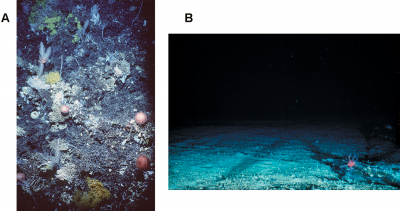by Riley Tjosvold
A recently published paper by researchers at the Institute for the Oceans and Fisheries (IOF) tracked the changes in China’s bottom trawl fishing policies from the 1950s to today.
By analyzing policy changes over time, the researchers were able to highlight the difficulties of managing the bottom trawling industry in China, a country that operates one of the world’s largest networks of bottom trawling fisheries both in its own waters and off foreign coasts in Africa, Asia and Oceania.

The Effect of Trawling the Seafloor for Groundfish. (A) The coral community and seabed on an untrawled seamount. (B) The exposed bedrock of a trawled seamount. Both are 1,000–2,000 meters (1094–2188 yards) below the surface. (Photo by CSIRO Marine Research.)
“China claims to lead sustainable fisheries development. Chinese leaders really want to make change so my intention with this paper is: if you want to make a change, you need to know about your history. What have you done over the past seven decades?” said Xiong Zhang, a postdoctoral research fellow with the IOF who led the study.
Since the 1970s, China has gradually implemented more sustainability-minded fisheries policies that, in theory, limit the amount of bottom trawling that can happen on China’s coast and elsewhere. However, the researchers found that these policy measures have not been effective at curtailing the harmful industry as compliance to them is likely low and China lacks a robust system of data collection for fisheries.
“There’s a growing demand for fish and for fishmeal to feed the agriculture. So, there is a strong incentive to still invest in bottom trawling. You cannot just stop bottom trawling entirely by ignoring the fact that the industry has incentive to grow,” Xiong said.
The paper also outlined steps that China can take to reduce its ecological footprint.
“One of my suggestions, or insights drawn from the history is that you have to get the attention of the general public, of the consumers, because they can drive change in the industry. They can motivate some of the top leaders to make change, to enforce the laws and policies. That’s a hope, that China may eventually move forward to sustainability,” Xiong said.
Tags: Amanda Vincent, bottom trawling, fisheries management, fishing gear, fishing practices, IOF postdoctoral fellows, Project Seahorse, sustainability, Xiong Zhang